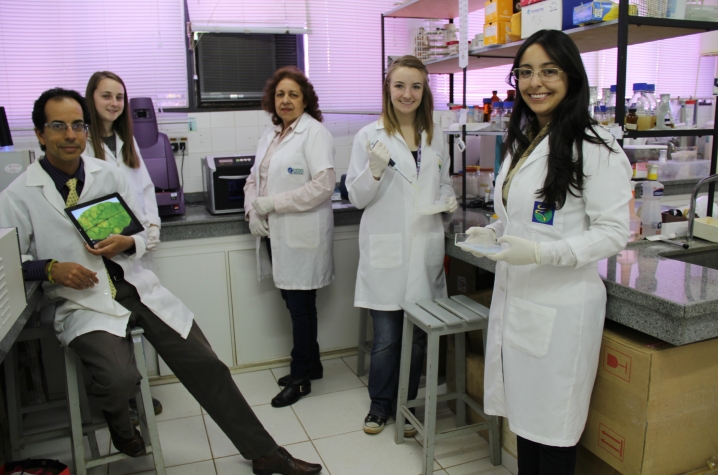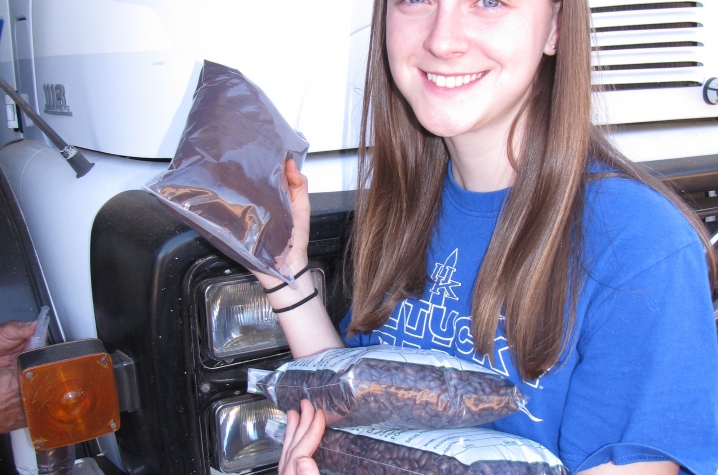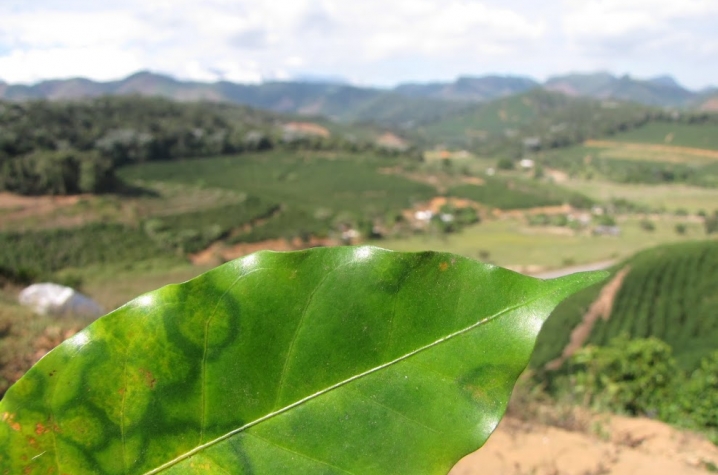Coffee Research Leads to Successful Partnership in Brazil
LEXINGTON, Ky. (Sept. 12, 2014) — Since its cultural debut in the fifteenth century, coffee has become one of the most heavily traded commodities in the world.
“Coffee is second only to oil in terms of value in globally traded commodities, followed in turn by natural gas and gold,” explained Michael Goodin, associate professor in the UK Department of Plant Pathology.
Nearly 35 percent of the world’s coffee is produced in Brazil alone. Today, however, coffee plants within Brazil have become infected by a virus, which has the potential to spread worldwide. The agronomic impact of this virus led Goodin to Brazil to study how this universal beverage and its production are being affected.
Two of Goodin’s students studying agricultural biotechnology accompanied him in Brazil for two months this past summer to study the prevalence of Coffee Ringspot Virus (CoRSV) on coffee plants in Brazil’s major production areas. Although the virus is not infectious in humans, the virus does affect the quality and production of coffee.
Goodin and his students visited farms around Brazil in order to collect infected coffee leaves to study the virus. The level of hospitality that they received throughout the country was exceptional.
“You don’t just visit [farms] – first there’s a tour of the farm, then they offer meals in their houses. Farmers are going out of their way for you. It’s like that everywhere in Brazil,” said Goodin. “Everyone was supportive for what we were doing.”
Drawing not only on the coffee resources within Brazil, Goodin and his students partnered with Antonia dos Reis Figueira and her student Thais Ramalho from Universidade Federal de Lavras (UFLA). The partnership between UFLA and UK was funded through two grants: one from the National Science Foundation (NSF) in the United States and the other through CAPES, the Brazilian equivalent of the NSF.
Goodin and his students, along with Figueira and Ramalho, were successful in the discoveries they made about CoRSV. With the discovered information, they were able to teach Brazilian farmers so they could self-diagnose their farms.
“We established the relationship between prevailing wind and sun exposure, which made it possible to identify potential virus ‘hot zones’ on farms. In addition, Brazil has been experiencing a drought similar to California, which is, in part, responsible for the spread of the disease, which was a surprise to everyone, including the farmers,” said Goodin.
Before Goodin and his students went to Brazil, Ramalho came to do a yearlong exchange at UK as a doctoral student through Brazil’s Scientific Mobility Program.
“It was the first time I went abroad. I was very happy with the opportunity but a little afraid, because everything was new to me,” said Ramalho. “In the Plant Pathology Department, where I worked for a year, everyone had extreme patience and solidarity with me. In the Goodin laboratory I learned new techniques, which had never been carried out in Brazil, and I was able to apply and teach these techniques at my university, UFLA.”
While working with Goodin at UK, Ramalho also had the chance to make friends and work with Olivia Jones and Layne Duff, the two undergraduate agricultural biotechnology major students who accompanied Goodin to Brazil.
Duff and Jones noted how the experience in Brazil contributed greatly to their growth.
“I learned so much more than just virology and the coffee industry,” said Duff. “I learned that this international language called ‘agriculture’ is one I’ve been speaking all my life. I found that despite the occasional language barrier, whenever we went to the farms to collect tissue, I had no trouble understanding the farmers’ concerns, victories, joys and hopes. This was because agriculture in and of itself surpasses boundaries and provides an immediate connection with everyone I was privileged to work with.”
Using samples collected in Brazil, the next step for the CoRSV research team is to study the genetic variation within hundreds of square miles of coffee production.
Goodin hopes to continue this productive partnership with UFLA.
“There are so many parallels between Brazil and the United States in terms of agricultural production. The departments in our College of Agriculture, Food & Environment are mirrored at UFLA,” said Goodin. “This presents seamless opportunities for student exchanges and research collaborations for faculty at both institutions.”
MEDIA CONTACT: Carl Nathe, 859-257-3200, carl.nathe@uky.edu or Jenny Wells, 859-257-5343; jenny.wells@uky.edu







